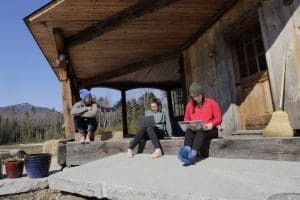Four states receive $500 million from Rescue Plan to expand high-speed internet access
The states will use the federal funds to improve broadband infrastructure in underserved communities.

On Tuesday, the U.S Department of the Treasury announced it would award $582.8 million in American Rescue Plan funds to four states — Louisiana, New Hampshire, Virginia, and West Virginia — to provide affordable, high-speed internet to underserved communities.
The federal funds will come out of the $10 billion Coronavirus Capital Projects Fund, which was designed to fund infrastructure improvements “in rural America, Tribal communities, and low- and moderate-income communities.”
“Treasury’s broadband funding represents a significant step in the Biden-Harris Administration’s unprecedented investment to increase access to high-speed internet and reduce broadband bills for every American household and business,” Deputy Secretary Wally Adeyemo in a statement.
Virginia plans to use its $219.8 million in CPF funds for its Virginia Telecommunication Initiative, which will help provide high-speed internet to an estimated 28% of locations that lack access.
West Virginia plans to use its $136.3 million in awarded Rescue Plan funds to serve an estimated 20,000 locations with high-speed connections.
Louisiana will use $176.7 million in CPF funds to serve an estimated 25% of the locations in that state that currently lack high-speed internet access.
And New Hampshire will use an initial $50 million in federal funds to serve 15,000 locations representing 50% of locations that still lack high-speed internet access.
Along with the Capital Projects Fund, the Rescue Plan has already committed an additional $8 billion to local and state governments to construct broadband infrastructure, as well as $7 billion to provide schools and libraries with internet access.
All of the states involved have agreed to participate in the Federal Communications Commission’s Affordable Connectivity Program, which provides a benefit to qualified households of up to $30 per month for internet service. Twenty broadband providers announced in May that they would cut prices for broadband for households that qualified to no more than $30 per month, making internet service free for many households. An estimated 11.5 million U.S. households have already signed up for the program.
The Affordable Connectivity Program is funded by the Infrastructure Investment and Jobs Act, which Biden signed into law last November. States are also using $100 million from the infrastructure law to install and upgrade existing broadband networks to eradicate the current “digital divide” that exists between underserved communities and those with existing high-speed internet service.
President Joe Biden signed the Rescue Plan last March after passing Congress with only votes from members of the Democratic Party.
“High-speed internet service is no longer a luxury — it’s a necessity,” the White House said in a statement last month. “But too many families go without high-speed internet because of the cost or have to cut back on other essentials to make their monthly internet service payments. Lowering prices — including the cost of high-speed internet service — is President Biden’s top priority.”
Published with permission of The American Independent Foundation.
Recommended

Biden calls for expanded child tax credit, taxes on wealthy in $7.2 trillion budget plan
President Joe Biden released his budget request for the upcoming fiscal year Monday, calling on Congress to stick to the spending agreement brokered last year and to revamp tax laws so that the “wealthy pay their fair share.”
By Jennifer Shutt, States Newsroom - March 11, 2024
December jobs report: Wages up, hiring steady as job market ends year strong
Friday’s jobs data showed a strong, resilient U.S. labor market with wages outpacing inflation — welcome news for Americans hoping to have more purchasing power in 2024.
By Casey Quinlan - January 05, 2024
Biden’s infrastructure law is boosting Nevada’s economy. Sam Brown opposed it.
The Nevada Republican U.S. Senate hopeful also spoke out against a rail project projected to create thousands of union jobs
By Jesse Valentine - November 15, 2023








































































